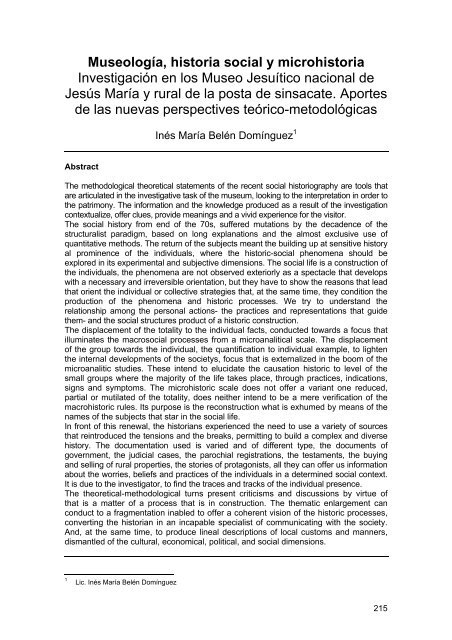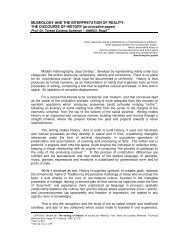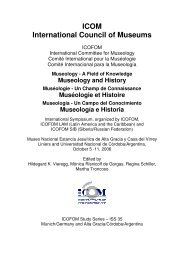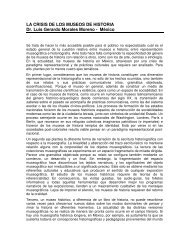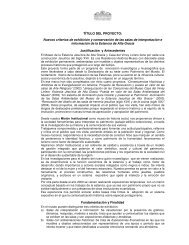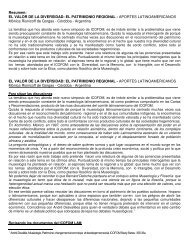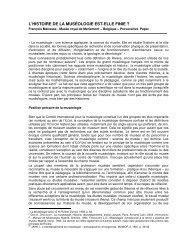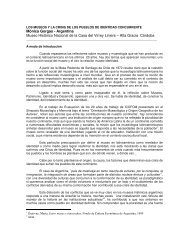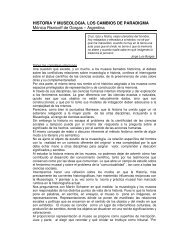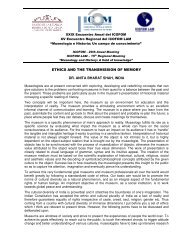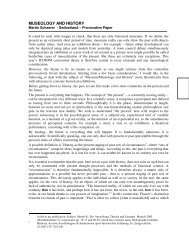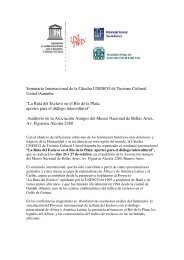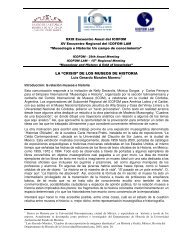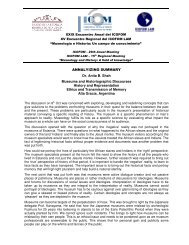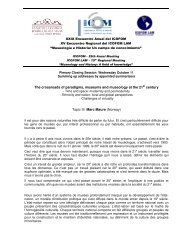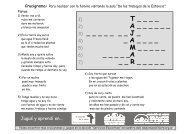- Page 1 and 2:
ICOM International Council of Museu
- Page 3 and 4:
Contents/Indice Museology and Histo
- Page 5 and 6:
González, Mary Edith (Argentina) E
- Page 7 and 8:
Foreword Museology and History - a
- Page 9 and 10:
Prefacio Cuando hablamos de Museolo
- Page 11:
Conferences / Conferencias
- Page 14 and 15:
Hinz: Museology and New National Mu
- Page 16 and 17:
Hinz: Museology and New National Mu
- Page 18 and 19:
Hinz: Museology and New National Mu
- Page 20 and 21:
Hinz: Museology and New National Mu
- Page 22 and 23:
22 Museology and New National Museu
- Page 24 and 25:
Hinz: Museology and New National Mu
- Page 26 and 27:
Hinz: Museology and New National Mu
- Page 28 and 29:
Hinz: Museology and New National Mu
- Page 30 and 31:
Hinz: Museology and New National Mu
- Page 33 and 34:
Provocative paper: Museology and Hi
- Page 35 and 36:
Schärer: Provocative Paper we can
- Page 37 and 38:
Schärer: Provocative Paper In conn
- Page 39 and 40:
Museología e Historia Martin Schae
- Page 41 and 42:
Schärer: Provocative Paper los ind
- Page 43 and 44:
Schärer: Provocative Paper sin cie
- Page 45 and 46:
Museology and History Martin Schaer
- Page 47 and 48:
Schärer: Provocative Paper physica
- Page 49 and 50:
Schärer: Provocative Paper sozusag
- Page 51 and 52:
Museologia e interpretação da rea
- Page 53 and 54:
Scheiner: Provocative paper Hoje j
- Page 55 and 56:
Scheiner: Provocative paper Em toda
- Page 57 and 58:
Scheiner: Provocative paper desejo
- Page 59 and 60:
Museología e interpretación de la
- Page 61 and 62:
Scheiner: Provocative Paper discurs
- Page 63 and 64:
Scheiner: Provocative Paper Ante to
- Page 65 and 66:
Scheiner: Provocative Paper deseo y
- Page 67 and 68:
Museology and the Interpretation of
- Page 69 and 70:
Scheiner: Provocative Paper represe
- Page 71 and 72:
Scheiner: Provocative Paper value.
- Page 73 and 74:
Scheiner: Provocative Paper and cle
- Page 75 and 76:
La Crisis de los Museos de Historia
- Page 77 and 78:
The Crisis of History Museums Luis
- Page 79 and 80:
L’histoire de la muséologie est-
- Page 81 and 82:
Mairesse: Provocative Paper improba
- Page 83 and 84:
Mairesse: Provocative Paper attitud
- Page 85 and 86:
Mairesse: Provocative Paper celui d
- Page 87 and 88:
¿Ha terminado la Historia de la Mu
- Page 89 and 90:
Mairesse: Provocative Paper du capi
- Page 91 and 92:
Mairesse: Provocative Paper A pesar
- Page 93 and 94:
Mairesse: Provocative Paper directa
- Page 95:
Papers / Documentos de trabajo
- Page 98 and 99:
Alves de Moraes: Museu e Museologia
- Page 100 and 101:
Alves de Moraes: Museu e Museologia
- Page 102 and 103:
Alves de Moraes: Museu e Museologia
- Page 104 and 105:
Alves de Moraes: Museu e Museologia
- Page 106 and 107:
Abstract 106 Historia, Museología
- Page 108 and 109:
Astudillo Loor: Historia, Museolog
- Page 110 and 111:
Barblan: D’Orient en Occident: hi
- Page 112 and 113:
Barblan: D’Orient en Occident: hi
- Page 114 and 115:
Barblan: D’Orient en Occident: hi
- Page 116 and 117:
Barblan: D’Orient en Occident: hi
- Page 118 and 119:
Barblan: D’Orient en Occident: hi
- Page 120 and 121:
Barblan: D’Orient en Occident: hi
- Page 122 and 123:
Barblan: D’Orient en Occident: hi
- Page 124 and 125:
Barblan: D’Orient en Occident: hi
- Page 126 and 127:
Barblan: D’Orient en Occident: hi
- Page 128 and 129:
Bartolomé: El Museo como espacio d
- Page 130 and 131:
Bartolomé: El Museo como espacio d
- Page 132 and 133:
Bartolomé: El Museo como espacio d
- Page 134 and 135:
Bartolomé: El Museo como espacio d
- Page 136 and 137:
Abstract 136 La virtualidad a las p
- Page 138 and 139:
Bautista: La virtualidad a las puer
- Page 140 and 141:
Bondone: Museologia e historia. El
- Page 142 and 143:
Bondone: Museologia e historia. El
- Page 144 and 145:
Bondone: Museologia e historia. El
- Page 146 and 147:
Bondone: Museologia e historia. El
- Page 148 and 149:
Brondo y otros: Un ¿nuevo? Paradig
- Page 150 and 151:
Brondo y otros: Un ¿nuevo? Paradig
- Page 152 and 153:
Brondo y otros: Un ¿nuevo? Paradig
- Page 154 and 155:
Brondo y otros: Un ¿nuevo? Paradig
- Page 156 and 157:
Brulon Soares: Heritage in Process
- Page 158 and 159:
Brulon Soares: Heritage in Process
- Page 160 and 161:
Brulon Soares: Heritage in Process
- Page 162 and 163:
Brulon Soares: Heritage in Process
- Page 164 and 165: 164 Le musée, le passé et l’his
- Page 166 and 167: Célius: Le musée, le passé et l
- Page 168 and 169: Célius: Le musée, le passé et l
- Page 170 and 171: Célius: Le musée, le passé et l
- Page 172 and 173: Célius: Le musée, le passé et l
- Page 174 and 175: 174 Museología e Historia. Un acer
- Page 176 and 177: Chacón Ferrer: Museología e Histo
- Page 178 and 179: Chacón Ferrer: Museología e Histo
- Page 180 and 181: Chacón Ferrer: Museología e Histo
- Page 182 and 183: Clissa: Las Fuentes judicales. De l
- Page 184 and 185: Clissa: Las Fuentes judicales. De l
- Page 186 and 187: Clissa: Las Fuentes judicales. De l
- Page 188 and 189: Abstract 188 Museums and Tourism: T
- Page 190 and 191: Marcela Cougo e Vieira Filho: O Est
- Page 192 and 193: Marcela Cougo e Vieira Filho: O Est
- Page 194 and 195: Marcela Cougo e Vieira Filho: O Est
- Page 196 and 197: Marcela Cougo e Vieira Filho: O Est
- Page 198 and 199: Cristofano: The Italian Contemporar
- Page 200 and 201: Cristofano: The Italian Contemporar
- Page 202 and 203: Cury: O visitante como sujeto da ex
- Page 204 and 205: Cury: O visitante como sujeto da ex
- Page 206 and 207: Cury: O visitante como sujeto da ex
- Page 208 and 209: Cury: O visitante como sujeto da ex
- Page 210 and 211: de Mello Vasconcellos Historia, mem
- Page 212 and 213: de Mello Vasconcellos Historia, mem
- Page 216 and 217: Domínguez: Museología, historia s
- Page 218 and 219: Domínguez: Museología, historia s
- Page 220 and 221: Domínguez: Museología, historia s
- Page 222 and 223: De la Cerda Donoso: Museos, sus esp
- Page 224 and 225: De la Cerda Donoso: Museos, sus esp
- Page 226 and 227: De la Cerda Donoso: Museos, sus esp
- Page 228 and 229: De la Cerda Donoso: Museos, sus esp
- Page 230 and 231: De la Cerda Donoso: Museos, sus esp
- Page 232 and 233: De la Cerda Donoso: Museos, sus esp
- Page 234 and 235: De la Cerda Donoso: Museos, sus esp
- Page 236 and 237: Fahmel Beyer: San Dionisio Ocotepec
- Page 238 and 239: Fahmel Beyer: San Dionisio Ocotepec
- Page 240 and 241: Fahmel Beyer: San Dionisio Ocotepec
- Page 242 and 243: Fahmel Beyer: San Dionisio Ocotepec
- Page 244 and 245: Farjala / Rodríguez: Patrimônio,
- Page 246 and 247: Farjala / Rodríguez: Patrimônio,
- Page 248 and 249: Farjala / Rodríguez: Patrimônio,
- Page 250 and 251: Farjala / Rodríguez: Patrimônio,
- Page 252 and 253: Fernández: La historia, el museo,
- Page 254 and 255: Fernández: La historia, el museo,
- Page 256 and 257: (Im)Porturas museológicas Lo polí
- Page 258 and 259: 258 Musées en guerre André Gob 1
- Page 260 and 261: Gob: Musées en guerre les biens co
- Page 262 and 263: Gob: Musées en guerre Il faut soul
- Page 264 and 265:
Gob: Musées en guerre Berlin jusqu
- Page 266 and 267:
Gob: Musées en guerre devenir. J
- Page 268 and 269:
González: El museo como espacio de
- Page 270 and 271:
González: El museo como espacio de
- Page 272 and 273:
González: El museo como espacio de
- Page 274 and 275:
González: El museo como espacio de
- Page 276 and 277:
González: El museo como espacio de
- Page 278 and 279:
278 Historia y Museología. Los Cam
- Page 280 and 281:
Gorgas: Historia y museología. Los
- Page 282 and 283:
Gorgas: Historia y museología. Los
- Page 284 and 285:
Gorgas: Historia y museología. Los
- Page 286 and 287:
Gorgas: Historia y museología. Los
- Page 288 and 289:
Gorgas: Muséologie et histoire. Le
- Page 290 and 291:
Gorgas: Muséologie et histoire. Le
- Page 292 and 293:
Gorgas: Muséologie et histoire. Le
- Page 294 and 295:
Gorgas: Muséologie et histoire. Le
- Page 296 and 297:
Gourarier: Un musée humaniste les
- Page 298 and 299:
Gourarier: Un musée humaniste Les
- Page 300 and 301:
Gourarier: Un musée humaniste Au X
- Page 302 and 303:
Gourarier: Un musée humaniste Aujo
- Page 304 and 305:
Gowland: La Potencialidad de una Ca
- Page 306 and 307:
Gowland: La Potencialidad de una Ca
- Page 308 and 309:
Gowland: La Potencialidad de una Ca
- Page 310 and 311:
Gowland: La Potencialidad de una Ca
- Page 312 and 313:
Gutiérrez: Hacia una nueva Represe
- Page 314 and 315:
314 The Representation of Salta’s
- Page 316 and 317:
Gutiérrez: Hacia una nueva Represe
- Page 318 and 319:
Harris: The Museum is not transpare
- Page 320 and 321:
Harris: The Museum is not transpare
- Page 322 and 323:
Harris: The Museum is not transpare
- Page 324 and 325:
Harris: The Museum is not transpare
- Page 326 and 327:
Hernández Hernández: El discurso
- Page 328 and 329:
Hernández Hernández: El discurso
- Page 330 and 331:
Hernández Hernández: El discurso
- Page 332 and 333:
Hernández Hernández: El discurso
- Page 334 and 335:
La Búsqueda de la Identidad de los
- Page 336 and 337:
Holguin: La Búsqueda de la Identid
- Page 338 and 339:
Holguin: La Búsqueda de la Identid
- Page 340 and 341:
340 The Ethics of Museums, The case
- Page 342 and 343:
Maranda : Museology and History: A
- Page 344 and 345:
Maranda : Museology and History: A
- Page 346 and 347:
346 The Museum Object as historical
- Page 348 and 349:
Maroević: The Museum Object as his
- Page 350 and 351:
Maroević: The Museum Object as his
- Page 352 and 353:
352 Museos: De la Relación públic
- Page 354 and 355:
Martini: Museos: De la Relación p
- Page 356 and 357:
Martini: Museos: De la Relación p
- Page 358 and 359:
Martini: Museos: De la Relación p
- Page 360 and 361:
Nostalgia 360 Mirror, window or sho
- Page 362 and 363:
Nostalgie 362 Un miroir, une fenêt
- Page 364 and 365:
Maure : Un miroir, une fenêtre ou
- Page 366 and 367:
Menezes de Carvalho: Museology with
- Page 368 and 369:
Menezes de Carvalho: Museology with
- Page 370 and 371:
Menezes de Carvalho: Museology with
- Page 372 and 373:
Abstract 372 OXÍMORON lab. IV th a
- Page 374 and 375:
Moreschi: Predeterminismo cultural
- Page 376 and 377:
Moreschi: Predeterminismo cultural
- Page 378 and 379:
Moreschi: Predeterminismo cultural
- Page 380 and 381:
Moreschi: Predeterminismo cultural
- Page 382 and 383:
Moura Tavares: Falando de Conhecime
- Page 384 and 385:
Moura Tavares: Falando de Conhecime
- Page 386 and 387:
Navarro: Museos nacionales y repres
- Page 388 and 389:
Navarro: Museos nacionales y repres
- Page 390 and 391:
Navarro: Museos nacionales y repres
- Page 392 and 393:
Navarro: Museos nacionales y repres
- Page 394 and 395:
394 Suceso y método: cómo cuentan
- Page 396 and 397:
Nazor: Suceso y método: cómo cuen
- Page 398 and 399:
Abstract 398 National Museum as Mem
- Page 400 and 401:
Õunapuu: National Museum as Memory
- Page 402 and 403:
Õunapuu: National Museum as Memory
- Page 404 and 405:
Palavecino: Museología e Historia.
- Page 406 and 407:
Palavecino: Museología e Historia.
- Page 408 and 409:
Pastrana: Museos, historia, imágen
- Page 410 and 411:
Abstract 410 Museo e Historia: Del
- Page 412 and 413:
Paz Núñez y Alegría: Museo e His
- Page 414 and 415:
Paz Núñez y Alegría: Museo e His
- Page 416 and 417:
Paz Núñez y Alegría: Museo e His
- Page 418 and 419:
Pupio: La historia indigena en muse
- Page 420 and 421:
Pupio: La historia indigena en muse
- Page 422 and 423:
Pupio: La historia indigena en muse
- Page 424 and 425:
424 Los Museos Historicos: Velos y
- Page 426 and 427:
Ríos : Los Museos Historicos : Vel
- Page 428 and 429:
Overview 428 Musealización de la H
- Page 430 and 431:
Rojo : Musealización de la Histori
- Page 432 and 433:
Rojo : Musealización de la Histori
- Page 434 and 435:
Rojo : Musealización de la Histori
- Page 436 and 437:
Salgado: “Sentir para comunicar l
- Page 438 and 439:
Salgado: “Sentir para comunicar l
- Page 440 and 441:
Salgado: “Sentir para comunicar l
- Page 442 and 443:
Museo, Patrimonio y Legitimación E
- Page 444 and 445:
Sansoni y Garma: Museo, Patrimonio
- Page 446 and 447:
Sansoni y Garma: Museo, Patrimonio
- Page 448 and 449:
Sepúlveda y otros: Museologías so
- Page 450 and 451:
Sepúlveda y otros: Museologías so
- Page 452 and 453:
Sepúlveda y otros: Museologías so
- Page 454 and 455:
Sepúlveda y otros: Museologías so
- Page 456 and 457:
Shah : Ethics and the Transmission
- Page 458 and 459:
Abstract 458 Cementerios Patrimonia
- Page 460 and 461:
Sosa: Cementerios Patrimoniales, Bi
- Page 462 and 463:
Sosa: Cementerios Patrimoniales, Bi
- Page 464 and 465:
464 Fascinating Historical Events o
- Page 466 and 467:
Lina Gebrail Tahan : Fascinating Hi
- Page 468 and 469:
Lina Gebrail Tahan : Fascinating Hi
- Page 470 and 471:
Lina Gebrail Tahan : Fascinating Hi
- Page 472 and 473:
Lina Gebrail Tahan : Fascinating Hi
- Page 474 and 475:
Lina Gebrail Tahan : Fascinating Hi
- Page 476 and 477:
Viel: Une muséodiversité au cœur
- Page 478 and 479:
Viel: Une muséodiversité au cœur
- Page 480 and 481:
Viel: Une muséodiversité au cœur
- Page 482 and 483:
Viel: Une muséodiversité au cœur
- Page 484 and 485:
Viel: Une muséodiversité au cœur
- Page 486 and 487:
Zinny: Visitas animadas Visitas ani


